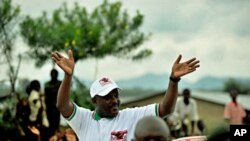The ruling party in Burundi has claimed victory in local elections held Monday. Despite two delays and opposition complaints, the head of the European Union election observer mission said the vote met international standards, and she praised the efforts of the central African nation.
On Monday, May 24 the citizens of Burundi cast their ballots to select members of local councils across the country. Voter turnout was very high. More than 90 percent of the Burundi's 3.5 million registered voters participated. Monday's local balloting was the first of five elections in the central African nation in coming months, which will include the selection of a president and parliament.
On Thursday, the head of the European Union election observer team, Renate Weber, released the mission's preliminary analysis of the polls, and praised Burundi for its civic participation. Weber said the initial round of voting was conducted in a peaceful atmosphere, and she expressed satisfaction with the overall process.
"So far the elections have taken place in a calm atmosphere," said Weber. "We are definitely extremely impressed with the massive participation of the people to the vote and we definitely are convinced that this is an extraordinary civic attitude. And it shows that the people of Burundi really want to be involved in the democratic development of their country."
Official results released Friday show the ruling National Council for the Defense of Democracy winning easily. According to the results, the ruling party captured about 64 percent of the vote. The former rebel group National Liberation Forces took 14 percent of the vote.
Despite the confidence of international observers, Monday's poll was not without controversy. The vote was initially scheduled for Friday, May 21st but delayed twice due to logistical issues.
Opposition groups expressed concerns about the moves and raised questions about the credibility of the vote. Though all parties eventually accepted the postponement, the National Liberation Forces called the results "impossible."
Eight opposition parties demanded a revote on Wednesday, and accused the electoral commission of an anti-opposition bias. The commission has stood its ground and asked for proof of the alleged fraud.
According to Weber, the delays had no effect on the voting process. The EU official dismissed concerns that opposition complaints would affect the election and called on all sides to deal with the issue through official channels.
"It is normal after an election to hear some actors who do not want to recognize or accept the result of an election. But, the truth is that they have to do it in the proper, legal way. So they have to file official complaints, either to the national commission or to those provincial commissions. And they have to come with the evidence of what they said. When someone speaks about fraud, they have to come with the evidence to prove it," said Weber.
Burundi has remained relatively calm throughout the voting process. Despite opposition concerns, there has been no real threat of boycott. Burundi is still recovering from a civil war that ended several years ago.
Attention now turns to presidential elections being held on June 28. As of Thursday, seven candidates, including six from the opposition, had registered as candidates. The ruling party candidate and current president Pierre Nkurunziza will face a strong challenge from National Liberation Forces candidate Agathon Rwasa. The president is also up against two former presidents of Burundi as well as two candidates from a breakaway faction of his own party. Mr. Nkurunziza is widely expected to win next month.
EU Observers Praise Burundi Election Despite Opposition Complaints




